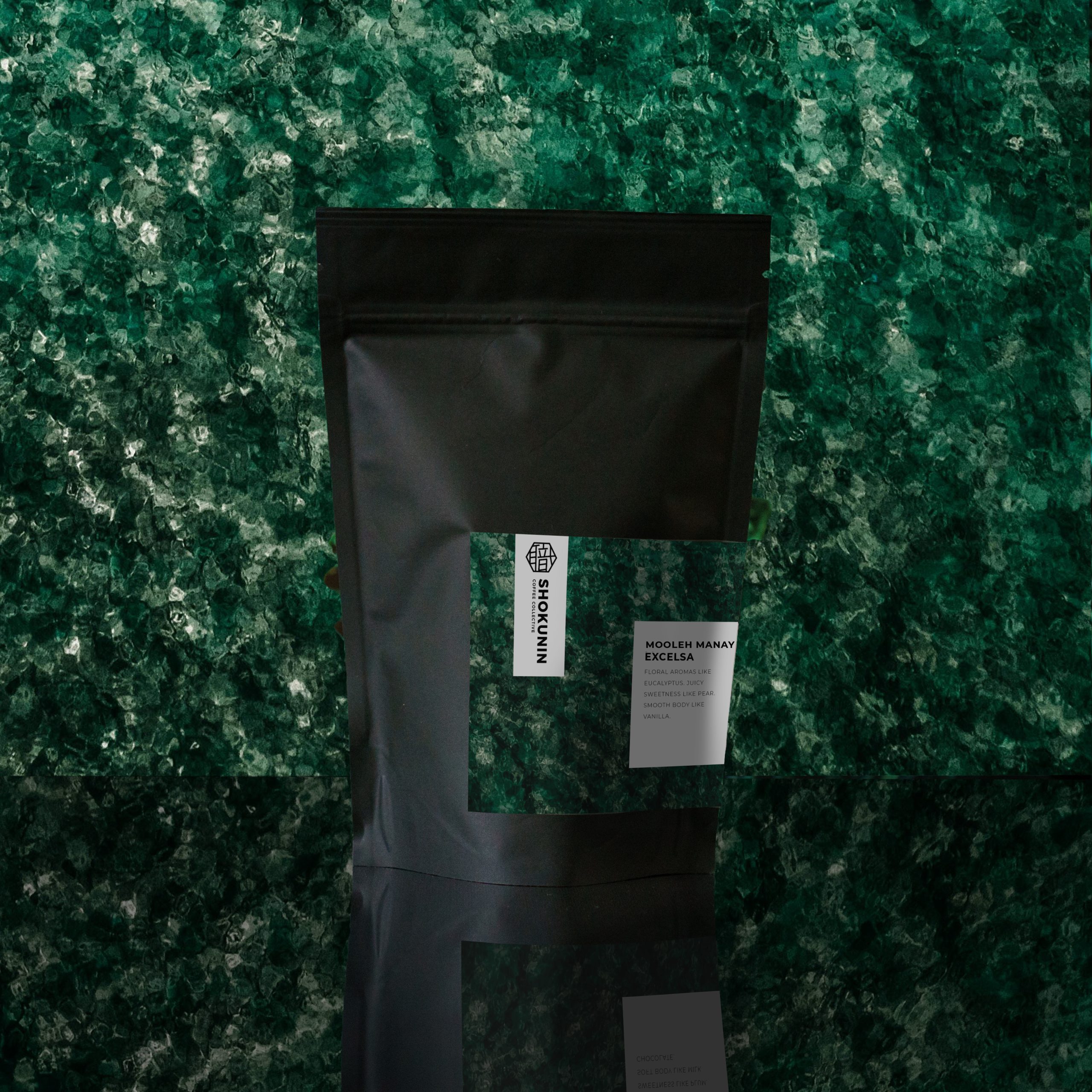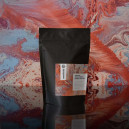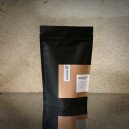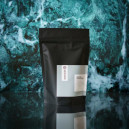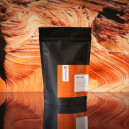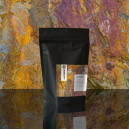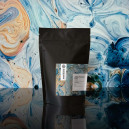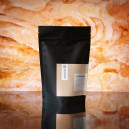Mooleh Manay Excelsa
The Excelsa variety is a unique and relatively unknown specie of coffee that does not belong to the Arabica family. It grows on trees rather than shrubs, has a distinct round shape and tastes different from any Arabica we’ve ever encountered!
Region: Coorg, Karnataka, India
Variety: Excelsa
Altitude: 900-1200 M
Processing: Anaerobic, 84hr cherry fermentation, dried in polyhouse.
Additional information
| Weight | N/A |
|---|---|
| Region | Galeh, Jimma, Oromia, Ethiopia |
| Altitude | 1,840 – 2,130 m.a.s.l. |
| Variety | Local varieties 74165, 75227, 74140, 74110, 74112 and 5227 |
| Processing | Natural, dried on raised beds |
| Flavour | Full, sweet aromas like black tea and passion fruit. Deep sweetness like melon and strawberry jam. Smooth, creamy body like hazelnut ice cream |
Jelle's Notes
When I first heard about this coffee, from a completely different branch of the coffee family, I was immediately intrigued. A different plant family altogether? I had to taste it. When I did, I knew right away it wasn’t like a Sidra or a Gesha. Those are elegant in their own way, but this was something else entirely. That difference is exactly what makes it exciting and why I wanted it in the range.
It still has the sweetness I always look for, but in a different form. Less fruit, more of a mix of floral notes, nougat, and a savory depth that I rarely find in Arabica. I’m a big fan of working with refined bitters, rather than just sweetness and acidity, which is what makes roasting this coffee a very rewarding challenge.
Everything about this coffee feels new to me: the variety, the flavor, and the country of origin. India is often associated with commercial-grade coffee, but there are producers exploring new specialty directions, and this lot is a great example. Working with them through This Side Up and South India Coffee Company has been smooth, and I hope this is the start of a long-term collaboration.
For me, it works best as a long black with the creamyness of espresso brews but more toned-down than a straight espresso. Letting the extraction run long with more water brings out even more complexity. It also works surprisingly well in short milk drinks like flat whites or cortados.
Producers
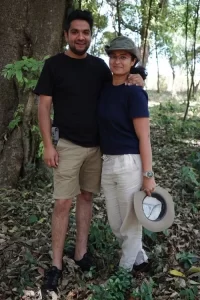 Mooleh Manay is a fifth-generation family estate in Coorg, set near the backwaters of the Harangi Reservoir. The name means “corner house” in Kannada, and the farm covers 75 acres with around 50,000 coffee trees. Arabica, Robusta, and Excelsa all grow here, processed as honeys or naturals.
Mooleh Manay is a fifth-generation family estate in Coorg, set near the backwaters of the Harangi Reservoir. The name means “corner house” in Kannada, and the farm covers 75 acres with around 50,000 coffee trees. Arabica, Robusta, and Excelsa all grow here, processed as honeys or naturals.
Komal and Akshay, who now run the estate, took over from fourth-generation planter Ms. G.G. Padmashree. Together with a core team of seven full-time workers, they manage the farm year-round. During harvest, the team grows to between 40 and 74 seasonal workers, about 70 percent of whom are women.
Komal and Akshay avoid weedicides across most of the farm, keep inputs low, and use fertilisers only when needed. At the same time, they are not afraid to experiment. From data-driven processing to species innovation, they are constantly looking for ways to push coffee forward while keeping the ecosystem in balance.
They are among the first in India to grow high-grade Excelsa, and they are also rediscovering native Indian species, introducing lesser-known ones, and even grafting different species together. It is exciting work, and it gives their farm a unique role in making coffee more climate resilient. Not just for themselves, but for their community and, in the long run, for the wider coffee world.
South India Coffee Company
 Their vision doesn’t stop at the farm. In 2017, Komal and Akshay founded South India Coffee Company (SICC) to connect Indian producers with roasters around the world. Having grown up in Coorg themselves, they knew the potential of Indian coffee. But during their time in the UK, they noticed how little of it was available. That sparked a mission: to put Indian specialty coffee on the map.
Their vision doesn’t stop at the farm. In 2017, Komal and Akshay founded South India Coffee Company (SICC) to connect Indian producers with roasters around the world. Having grown up in Coorg themselves, they knew the potential of Indian coffee. But during their time in the UK, they noticed how little of it was available. That sparked a mission: to put Indian specialty coffee on the map.
SICC works with farms across India, helping producers with training, infrastructure, soil testing, and even manpower during harvest. They also open new markets and create opportunities for farmers to thrive. For Komal and Akshay, economic sustainability and environmental care go hand in hand. One cannot exist without the other.
Today, SICC operates across India, the UK, and the USA, and partners with roasters in Europe, Saudi Arabia, and Singapore. Their work is rooted in the belief that specialty coffee can bring positive change when everyone in the chain, from farmer to roaster, is able to grow together.
We were introduced to Mooleh Manay through This Side Up, who saw the potential in their work and thought it might be a good fit for us. They were right. This is a producer with curiosity, care, and a willingness to try something different. That spirit comes through in the coffee, and it is exactly why we are so excited to share it.
Variety
Excelsa is one of the lesser‑known branches of the coffee family, long overshadowed by Arabica and Robusta. For years it was considered its own species, before being reclassified in 2006 as a variety of Liberica. That back‑and‑forth may have added to the confusion and is one reason Excelsa has received so little recognition in the global market.
In India, where we source this Excelsa, it is often grouped together with Liberica under the local name Mara Kaapi, or “tree coffee.”  The name fits the plant. Excelsa trees can grow over 15 meters tall, and traditionally they were planted along the borders of farms to mark boundaries and provide a little extra income. Picking the cherries means climbing into the branches with ladders, and if the fruit is left too long it can attract berry borer. Because of these challenges, many farms removed Excelsa over the years.
The name fits the plant. Excelsa trees can grow over 15 meters tall, and traditionally they were planted along the borders of farms to mark boundaries and provide a little extra income. Picking the cherries means climbing into the branches with ladders, and if the fruit is left too long it can attract berry borer. Because of these challenges, many farms removed Excelsa over the years.
Now, producers in Coorg and beyond are taking a second look. Farms like Mooleh Manay are experimenting with Excelsa not only for its cup quality but also for its potential role in climate resilience. By rediscovering and replanting it, they are helping to bring back a coffee that was once pushed to the margins, and in the process opening up new possibilities for the future of specialty coffee.

The beans are smaller and rounder than other coffee types, and they stand out for their distinct flavor. Tests also show it has lower caffeine than Arabica, usually between 0.7 and 0.98 percent. Our producers’ grandfather‑in‑law always kept Excelsa separate, recognizing its fruity notes. Even when prepared with milk, those flavors remain clear.
South India Coffee Company sees Excelsa as a chance to explore new flavors and new directions for specialty coffee. Out of more than 130 Coffea species, the world has focused almost entirely on Arabica and Robusta. By researching Excelsa, documenting its differences, and experimenting with processing, they are helping to bridge the knowledge gap and bring this unique coffee back into the spotlight.
Pricing
Price Breakdown (/kg)
For us, sourcing coffee isn’t just about finding the right flavour, but more about finding the right people. We want to work with importers who are interested in building lasting relationships with the farmers and stay involved beyond the harvest. For this coffee, we’ve partnered with
This Side Up. They represent producers directly, support long-term systems, and make sure pricing reflects the real work behind each lot. Their model is built on transparency, shared ownership, and a refusal to let commodity pricing define value. We pay more, but we know where it goes. That’s how we prefer to source our coffee.
Prices shown are reference estimates, recalculated proportionally based on the roaster’s original payment. Estimated price per kilogram in euros for this lot, paid by Shokunin. The coffee is imported directly, and costs are calculated using the average 2025 EUR–USD conversion rate.
€26.55
€29.02
How is this built up?
€17.34
€3.84
€24.39
€0.84
€1.51
€0.06
€2.43

